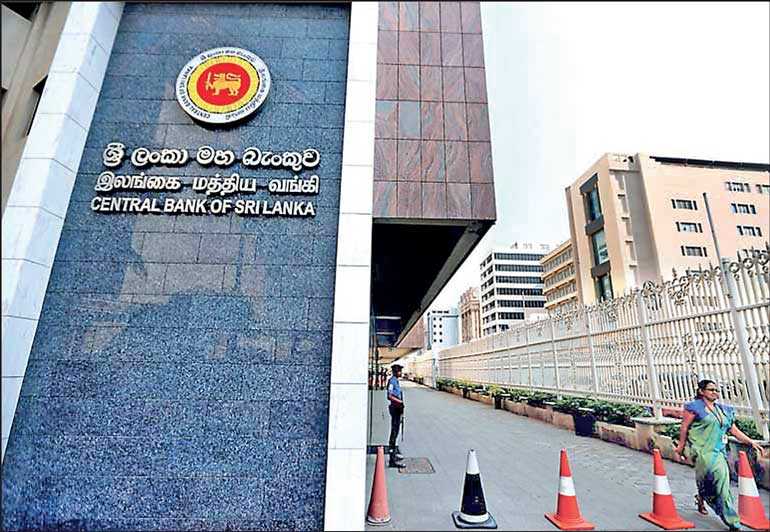Thursday Feb 19, 2026
Thursday Feb 19, 2026
Friday, 17 July 2020 00:00 - - {{hitsCtrl.values.hits}}

The latest Treasury Bills issue by the CBSL, which closed at a record low interest after several years, is indicative of many aspects of our economy. In a close-up view, the sale has provided for a borrowing of  Rs. 29,500 million, at rates below 5%. The excess liquidity created by the Central Bank by lowering the Statutory Reserve Requirement of commercial banks to 2% recently has in fact created a cheap borrowing market for the Government, and has failed to adequately stand as a fiscal stimulation to support and resuscitate the business community as expected.
Rs. 29,500 million, at rates below 5%. The excess liquidity created by the Central Bank by lowering the Statutory Reserve Requirement of commercial banks to 2% recently has in fact created a cheap borrowing market for the Government, and has failed to adequately stand as a fiscal stimulation to support and resuscitate the business community as expected.
All are talking about the situation created by the COVID-19 pandemic, which is leading towards a global economic crisis much worse than the 2008 financial crisis. In this context there is a strong focus on broad economic issues, such as: the falling demand for Sri Lankan exports, depleting remittances from foreign employment, the fast-collapsing tourism industry, and the disastrous status of the business environment. Immediate attention had to be paid to the dangers faced in the business sector, threatening closures and reducing labour and employment opportunities due to unavoidable consequences of the pandemic situation. The Sri Lankan Rupee has depreciated by several percentage points, fortunately still within single digit, from the onset of the disease.
Worse affected is the informal sector within the self-employed and unemployed sectors. The exigencies of providing social protection to the needy, as well as those adversely hit due to the health crisis, became all the more important, and had to be considered as the highest priority.
All this cropped up in a not-so-rosy environment that was in existence towards the latter part of 2019, with unexpected further downfalls of the already ailing economy the country was facing. The Easter Sunday attacks worsened the declining annual growth rates, which existed at a low level of around 2 points, the disparity prevailing between the revenue and expenditure of the Government was very high, with a negative value of about 6% of the total GDP. About 40% of this revenue too remained committed to serious debt payment requirements.
Political changes, cost of elections followed by a host of other costly cuts in Government incomes due to tax concessions etc. had hit the country’s economy badly, even before the onset of COVID -19. Most of these have been implemented hastily due to decisions short of properly planned economic measures based on long term concerns. It is not very clear and certain whether the steps taken to revive the private sector have delivered the desired results. Anyway, the sudden creation of a heavy liquidity in the market is seen as a measure that has neither helped in the revival of business activities, nor given adequate assistance to the large number of families exposed to the shock of the crisis, aggravating their prevailing poor living standards with insecure incomes.
It is reported that the liquidity created due to the sudden reduction of the SRR by the CBSL is around 200 billion. While it is important to support the industry and the business sector, there is an equally important need and priority to provide social protection stimulus to the hardest-hit, poorest families and the middle income groups in the informal sector. The measures taken by the Government so far does not adequately provide the relief to these groups, and in the event of the crisis extending further, the incomes of a large majority of citizens will fall to very low levels, which will impact the GDP adversely. This will worsen the impact of COVID-19 and will make people more vulnerable to the disease while living standards will drastically deteriorate.
International bodies such as the United Nations Social Protection Working Groups have commented on these requirements in their efforts to bolster economic recovery in the COVID-19 crisis. Highlighted below are some of the more relevant concerns addressed by them in one of their reports relating to Sri Lanka:
Sri Lanka is at the risk of a deep economic recession, potentially a fall up to 8% in annual GDP if the COVID -19 continues longer
The impact on family well-being will be significant. A large percentage of the population have already reduced their consumption of food, leading to severe health problems of children
With about 66% of the labour force working informally, many women undertaking domestic labour under limited social protection support have fallen into this vulnerable category
To address the recession and protect families, it will be necessary for Sri Lanka to put in place a large fiscal stimulus package, comprising social protection transfers to families and to all sectors equitably
It is recommended that it is crucial for the Government to support the family incomes for a further 6 months, while continuing with strong fiscal response to boost the economy and enable its recovery
They have quantified the extent and recommended that a total investment of 1.5% of GDP which is equivalent to Rs. 233 billion. This is a serious situation that warrants the interest, focus and attention of all irrespective of petty politics to keep the country saved from disaster. There should be a fair, transparent and easily understood fiscal stimulus capable of reaching the majority of people to kick-start an economic recovery program.